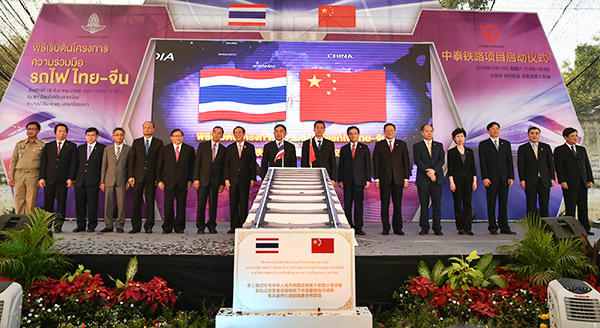Thai railway project offers cautionary tale
Updated: 2016-04-05 07:47
(China Daily)
|
||||||||
 |
|
Officials from China and Thailand attend the launching ceremony of the railway project on Dec 19, 2015. [Photo/Xinhua] |
Thailand has reportedly decided to solely fund the construction of a 250-kilometer high-speed railway between Bangkok and the city of Nakhon Ratchasima.
This was intended to be the first section of a planned 845-km high-speed railway running from the Thai-Laos border to Thailand's industrial seaboard, for which a Chinese loan had been agreed after nine rounds of painstaking negotiations between Beijing and Bangkok over two years.
Thai Transport Minister Arkhom Termpittayapaisith said on March 25 that China should offer "friendship" terms on the interest rate of the loan and project costs. He suggested the interest rate should be reduced from 2.5 percent to 2 percent, the same rate China offered Indonesia last year for a high-speed rail project, and China bear the bulk of the costs as the project is of benefit to it.
But Thailand has not offered the same terms as Indonesia to secure a loan.
As part of its agreement with Indonesia, Chinese companies are entitled to develop some land along the Jakarta-Bandung high-speed railway through joint ventures with Indonesian partners. But Thailand has refused to give China such opportunities.
The reports also suggest that Thailand is suspending the rest of the project. If this is the case, the project will be much smaller and of less significance to the Southeast Asia nation than was planned, and it is the Thai economy that will be the main beneficiary.
Certainly, Thailand has every reason to make decisions according to its financial and economic situation. But the twists and turns of the project should persuade China to adjust its strategies and approach so other countries better understand its Belt and Road strategy.
As a supplier of the world's best cost-for-performance high-speed trains and related services, China has the technology and experience to attract customers. It does not need to surrender the benefits it should yield in exchange to do so.
Introduced as a program to promote win-win cooperation, the Belt and Road Initiative is not a vehicle for different countries to strive for China's financial assistance, but is based on equal and prudent cooperation that involves uncertainties and risks undertaken by both sides.
In this sense, a shrinking high-speed railway project in Thailand could be a slow but sure step forward for China's outbound endeavors.
- China expects smooth railway cooperation with Indonesia, Thailand
- Chinese tourists open their wallets in Thailand, Japan, S. Korea
- Robotic telescope built by China and Thailand put into operation
- Nation's solar panel makers take a shine to Thailand for growth
- More Chinese investment welcomed in Thailand's high-tech sector: Minister
- China inks nuclear power partnership deal with Thailand
- China-Thailand railway project kicks off
- Xi: Talks 'only correct way' for China, ROK
- Xi to Obama: Disputes should be managed
- Cypriot court remands in custody man suspected of hijacking EgyptAir flight
- Govt eyes luxury tourists amid concerns over safety
- Sleep tight and don't let sharks bite at Paris aquarium
- Aung San Suu Kyi appointed as Myanmar's new foreign minister

 Ancestral temples continue to bring family members together
Ancestral temples continue to bring family members together
 Culture Insider: 8 things you may not know about Clear and Bright
Culture Insider: 8 things you may not know about Clear and Bright
 Discover beautiful China in spring blossom (IV)
Discover beautiful China in spring blossom (IV)
 Stars shine at gala of World Figure Skating Championships
Stars shine at gala of World Figure Skating Championships
 Female cops combine warmth with strictness
Female cops combine warmth with strictness
 BYD launches two new electric models, Qin EV and e5
BYD launches two new electric models, Qin EV and e5
 Discover beautiful China in Spring blossom (II)
Discover beautiful China in Spring blossom (II)
 Xi calls for bigger progress in China-Denmark ties
Xi calls for bigger progress in China-Denmark ties
Most Viewed
Editor's Picks

|

|

|

|

|

|
Today's Top News
Marriott unlikely to top Anbang offer for Starwood: Observers
Chinese biopharma debuts on Nasdaq
What ends Jeb Bush's White House hopes
Investigation for Nicolas's campaign
Will US-ASEAN meeting be good for region?
Accentuate the positive in Sino-US relations
Dangerous games on peninsula will have no winner
National Art Museum showing 400 puppets in new exhibition
US Weekly

|

|







